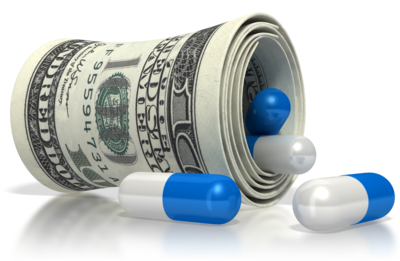 The subject of drug prices is making the news much more frequently. An opinion piece in the Wall Street Journal this week pointed out drugs are only 10% of the cost of American healthcare. My research indicated it was closer to 15%, but even at 10%, the cost approaches $400 billion. The article was written by a lawyer who formerly ran a drug company. I wrote in Health Attitude pharmaceutical research is risky and costly. Big pharma needs to have above average returns to support the research. The lawyer did not mention the 1,500 lobbyists in his industry spending more on politicians than any other industry by a long shot.
The subject of drug prices is making the news much more frequently. An opinion piece in the Wall Street Journal this week pointed out drugs are only 10% of the cost of American healthcare. My research indicated it was closer to 15%, but even at 10%, the cost approaches $400 billion. The article was written by a lawyer who formerly ran a drug company. I wrote in Health Attitude pharmaceutical research is risky and costly. Big pharma needs to have above average returns to support the research. The lawyer did not mention the 1,500 lobbyists in his industry spending more on politicians than any other industry by a long shot.
I don’t want government price controls, although there is a growing chant to impose them. I do want more transparency. Suppose a cancer drug was developed based on research paid for by the Nations Institutes for Health; i.e. taxpayer money, and the drug has a 90% gross profit. And how much did the drug company pay to doctors and hospitals for their support. Taxpayers and policymakers should be aware of these factors. There are reported cases of oncologists who receive money from pharma to use drug A instead of drug B even though there is no clinical evidence drug A is better, but it costs twice as much or in some cases 10X.
Another news story this week reported about a philanthropic couple in Texas who made a grant for research into the efficacy of the most expensive drugs. Some drugs cost hundreds of thousands of dollars, but have limited impact. Other countries are saying no to drugs that extend life by weeks. The high costs are going to force the conversation about how much is a life worth. When the patient’s family is not paying for the drug, there is no price too high to add even days to a loved one’s life. I wrote in Health Attitude about a gentleman in this situation. He said, if he had to pay for it, he would say no, it is not worth it. In today’s news was a story about more than 100 oncologists who signed a plea in a Mayo Clinic newsletter for something to be done about the cost of cancer drugs. They are the ones that bring the news to the patient. They are the ones that witness patients and families cashing in all their assets to pay for drugs and then go bankrupt piling financial suffering on top of medical suffering.
Another point the lawyer did not mention is the big pharma investment of billions of dollars into direct to consumer (DTC) advertising. The U.S. is the only country that allows it, thanks to the lobby. Consumers see 13 commercials per day about cures for things most don’t have. Another solution to the ballooning problem of drug cost is to allow Medicare to negotiate directly with big pharma over the cost of drugs. Congress decided in 2003 Medicare should not negotiate. Thanks again to the lobby. At that time Medicare was probably 25-30% of healthcare spending. Now it is double that. Big pharma can set whatever prices they want. In theory, competition can bring down the prices. In practice it has had minimal impact.
